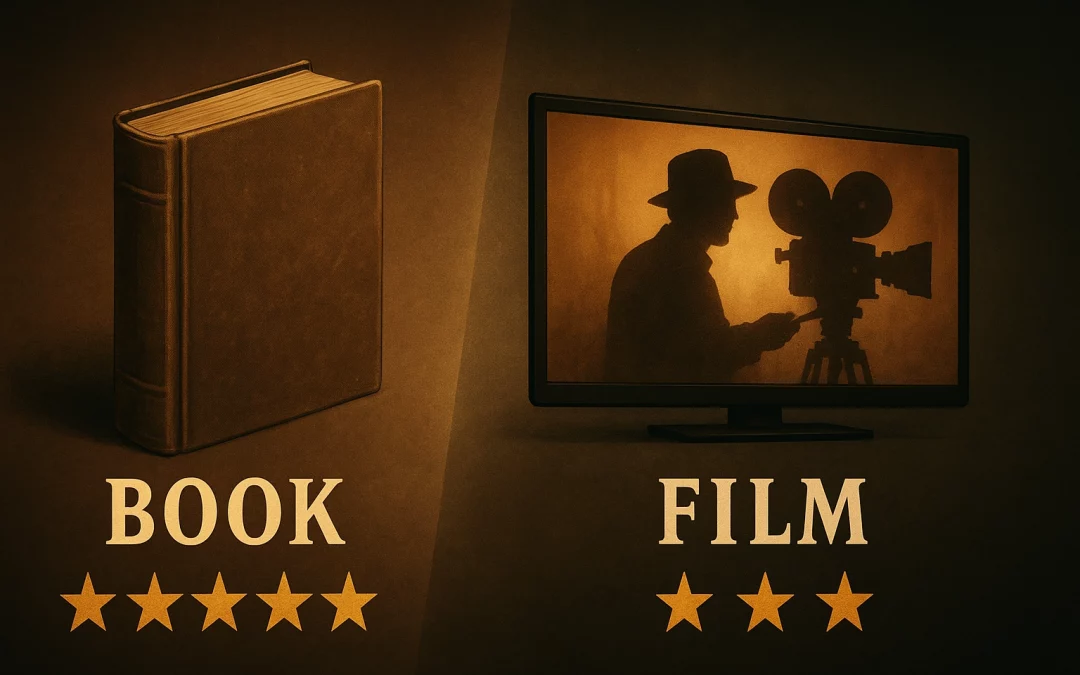Do you get upset when a film based on a book you love isn’t faithful to the original? You’re not alone.
Fantasy readers, in particular, are notorious for feeling let down by screen versions of their beloved worlds.
But should fidelity really be the gold standard? Adaptation theory suggests otherwise.
And understanding this tension can actually deepen your appreciation of both the book and its adaptation.
Fidelity vs. Transformation
The most common way fans judge adaptations is through fidelity: did the showrunners stick to the plot, keep every character intact, and honour the book’s ending?
Yet adaptation theory challenges this idea. Scholars argue that every adaptation is an interpretation, not a carbon copy.
From a theoretical perspective, change is inevitable. When His Dark Materials shifted certain scenes around for television pacing, or when Foundation re-imagined characters to bring more gender diversity, these weren’t simply betrayals. They were transformations, a way of reshaping the narrative for a different medium and a different moment in culture.
YOU MIGHT BE INTERESTED: High Fantasy Novels on Screen: Epic Worlds Reimagined
Medium Specificity: What Page Can Do vs. What Screen Can Do
Books and screen media operate under different rules. Medium specificity is the idea that each medium has unique affordances.
Novels let you hear a character’s inner monologue, explore digressions, and spend whole chapters on worldbuilding.
Film and TV rely on performance, cinematography, sound, and editing. They condense and externalise.
This is why a sprawling fantasy novel like The Wheel of Time will never appear uncut on screen.
A ten-page chapter describing the architecture of a city becomes a single sweeping shot. A subtle internal conflict becomes a look on an actor’s face. The medium demands change.
Intertextuality: Adaptations in a Web of Stories
Adaptations don’t exist in isolation. They’re part of a wider intertextual web: they interact not only with the source book but also with genre conventions, audience expectations, and even other adaptations.
Take Game of Thrones. By the time the later seasons aired, viewers weren’t only comparing the show to George R. R. Martin’s books; they were comparing it to years of fan theories, forum debates, and even rival fantasy shows.
Every choice (cutting subplots, altering arcs) was judged not just against the novels, but against the entire cultural conversation around them.
Audience Reception: Why Fans Take It Personally
Adaptation theory also highlights audience reception, the idea that viewers bring their own expectations and interpretations. For fantasy readers, the stakes feel especially high because the stories are immersive. We don’t just read them; we live in them.
When adaptations alter characters or tone, it clashes with the personal “mental adaptation” we’ve already created.
That’s why fan outcry can seem so fierce. For many, it’s not about theory; it’s about identity. The book became part of them, and the adaptation feels like rewriting that personal bond.
YOU MIGHT BE INTERESTED: 9 Contemporary Fantasy Books That Became TV Shows
Beyond the Fidelity Trap
So how can we, as readers and viewers, reconcile the clash between adaptation theory and fan expectations?
- Look for the spirit, not the letter. Ask if the adaptation carries the same themes and questions, even if the details change.
- Appreciate the medium shift. What can the screen show (through visuals, music, performance) that the page cannot?
- See adaptations as conversations. Each new version adds to the cultural dialogue rather than replacing the source.
This doesn’t excuse lazy or careless adaptations, but it does give us a richer way to watch.
| Clash Point | Adaptation Theory View | Fan Expectations / Reactions |
|---|---|---|
| Fidelity vs. “Authenticity” | Exact fidelity is neither possible nor always desirable; adaptations inevitably transform stories because media have different affordances. | Fans expect close alignment with the book. Changes to plot, character, or scenes often feel like betrayal and loss. |
| Theme & Tone Alteration | Tone and theme may shift due to medium, audience appeal, or production needs. | Fans see tone as central to the book’s “heart.” Shifts can feel like dilution or misunderstanding. |
| Character Change & Core Identity | Combining, omitting, or altering characters is often necessary for pacing or narrative economy. | Fans view characters as non-negotiable. Alterations feel like erasing beloved identities. |
| Structural & Pacing Changes | Books allow digressions and slow development; screen versions must condense and restructure. | Fans resent omissions or compression, seeing them as rushed, underdeveloped, or missing favourite scenes. |
| Audience Expectations & Context | Adaptations are shaped by cultural moment, medium, budget, and production constraints. | Fans treat the source as fixed and timeless, expecting it to be respected regardless of external limits. |
| Fan Theories & Nostalgia | Theory accepts multiple possible interpretations of a story. | Fans arrive with mental maps, theories, and nostalgia. Any deviation can feel like a loss of their version. |
| Transparency & Explanation Gap | Adaptation decisions are part of the process; context matters. | Without explanations, fans assume changes are careless or ignorant, fuelling distrust and backlash. |
The Takeaway
Adaptation theory reminds us that transformation is part of the deal.
Fans remind us why the deal matters: because stories shape us deeply.
The clash between the two isn’t a problem to solve but a dialogue to embrace.
So the next time your favourite fantasy novel makes it to the screen, hold on to the book you love, but stay open to the adaptation as its own creation. The best screen versions don’t erase the original; they send you back to it with fresh eyes.
What about you? Which fantasy adaptation felt true in spirit even if it strayed from the page? And which one crossed the line for you?

D.P. Martinez is a contemporary fantasy author specialising in urban fantasy and magical realism. He holds an M.A. in English Literature from the University of Greenwich, where he focused on Literary London. His research explored metaphorical representations of London in urban fantasy. He has written hundreds of articles and several books across both fiction and non-fiction.

